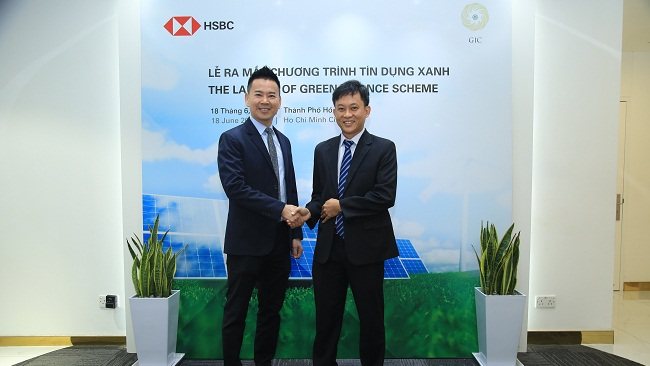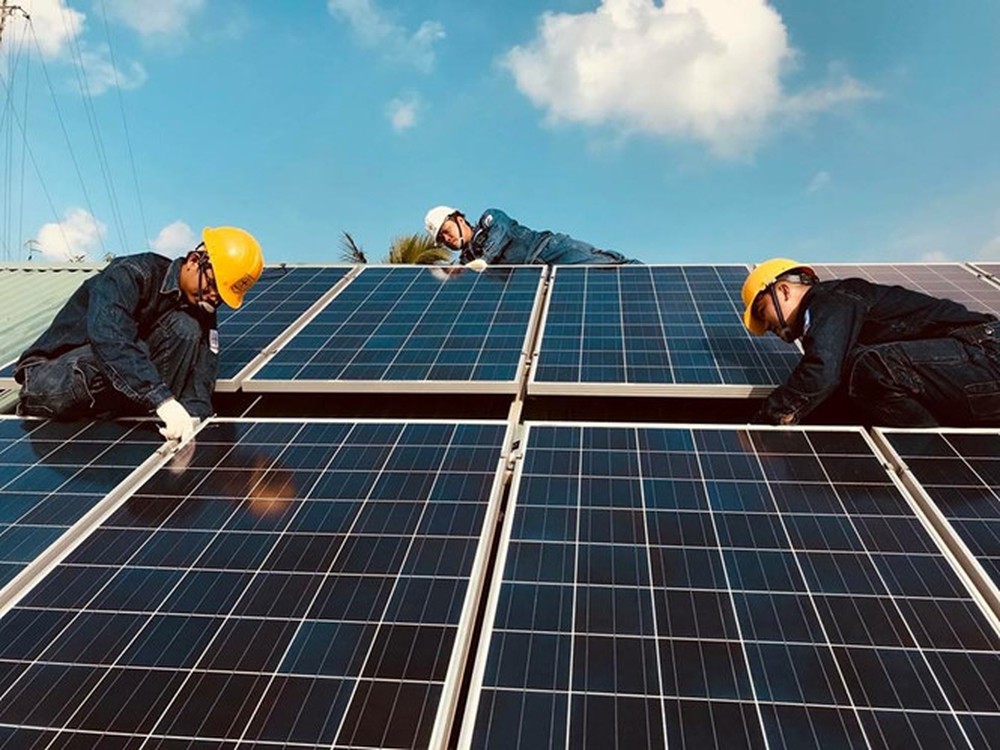
Green finance is now available for rooftop solar power projects in Vietnam.
Homeowners will now be able to apply for the special interest lending programme at HSBC Vietnam to purchase their own rooftop solar energy system amid growing demand for energy, especially clean energy, from private homeowners.
The preferential green lending scheme comes as part of HSBC’s global commitment to sustainable finance, in which the UK-based lender has pledged to provide $100 billion of sustainable financing and investment by 2025 around the world.
Existing HSBC Vietnam’s customers who have an intention to install a rooftop solar energy system for their landed house in Danang and Ho Chi Minh City, can apply for the green loan and receive the financing while enjoying HSBC’s lowest unsecured loan variable interest rates of 11.99 per cent and 12.99 per cent for premier customers and mass retail customers, respectively. A long repayment term of up to 60 months is also an advantage of the programme.
In addition, premier customers can enjoy a 14% discount on the list price, while other customers will be entitled to a 12% discount.
Offered in conjunction with renewable energy company GIC Investment JSC (GIC), the new loan product is a simple and affordable way for existing HSBC customers to power up their house with solar energy while reducing the cost of monthly electricity bills by leveraging on an unlimited energy source, easing the national power supply and contributing to a more sustainable future of the country.
“More and more Vietnamese are increasingly aware that using solar energy is more sustainable and willing to invest in this system,” said Le An Khang, chairman of GIC. “But for homeowners, the big question has always been: “Can I afford this?” That’s why we are so excited to join hands with HSBC Vietnam to create this ‘Green Loan’ product.”
According to GIC chairman, the costs for these systems depend on their capacity. With an investment of VND75.38-78.53 million for a 3.15-kilowatt-hour system, households can generate 38-410 kilowatt hours of electricity per month and can recover the capital in five to six years.
GIC’s rooftop solar energy systems, meanwhile, are manufactured and certified according to European quality standards with 12-year product warranty and 25-year performance warranty.
Phuong Tien Minh, head of HSBC Vietnam’s Retail Banking and Wealth Management, said installing rooftop solar systems will help households cut their electricity bills. For example, households with monthly electricity bills of some VND2 million each can save some VND1 million.
“It’s more essential than ever that economic growth strives to achieve maximum sustainability and in that regard we acknowledge our role to accompany customers in this development process. We always understand and meet customer needs through suitable products and solutions while enhancing customer experience so that they can enjoy a green life,” said Phuong Tien Minh.
“For that reason, HSBC Vietnam is delighted to enter a partnership with GIC, which shares our passion for promoting clean energy and green solutions in Vietnam. Over the last six months, we have been working closely with each other to devise a quality lending programme that we believe can really make a difference.”
Widespread use of solar panels in residential areas through the country would help ease the strain on the national power grid in Vietnam as well as positively affect the environment and boost climate resilience. With power demand projected to increase by 8 per cent annually during 2021 - 2031, Vietnam needs 60,000MW of electricity by 2020, 96,500MW by 2025, and 129,500MW by 2030. To do so, the government is moving forward to develop renewable energy sources to ensure energy security and address the growing power demand.
By creating a new lending product to support the production and consumption of solar energy in residential areas, HSBC Vietnam plays a vital role in contributing to greener and more sustainable communities in which the bank operates, supporting its clients in their sustainability efforts through embedding sustainability consideration into our products and services.

Workers install rooftop solar panels. HSBC Vietnam is cooperating with GIC Investment JSC to offer loans to individual customers in HCMC and Danang to install rooftop solar systems. (Photo: TNO)
In related news, the Ministry of Industry and Trade has added a solution on prices for electricity generated from solar power projects to a prime minister’s draft decision on policies to encourage the development of solar power in Vietnam, according to Nguoi Lao Don newspaper.
The ministry suggested classifying localities in the country into two zones: zone II with provinces holding high potential for solar power development, including the Phu Yen, Gia Lai, Daklak, Khanh Hoa, Ninh Thuan and Binh Thuan, and zone I consisting of the remaining cities and provinces.
The prices for electricity generated from floating, ground-mounted and rooftop solar power projects in zone I are proposed at VND1,758, VND1,620 and VND1,916 per kilowatt hour, respectively.
Meanwhile, each kilowatt hour of electricity generated from rooftop and ground-mounted solar power projects in zone II will be bought at VND1,803 and VND1,525, respectively.
According to the ministry, the proposal will help save money to support localities with low potential for solar power development. However, it may discourage investors from developing projects in the northern and central provinces and the country may fail to reach its renewable power generation targets.
In addition, zone II may become the location for many solar power projects, leading to the overload of transmission lines.
As a result, the ministry proposed the Government choose the solution of four zones suggested earlier. Specifically, the prices of electricity generated from solar power projects will be VND2,102, VND1,809, VND1,620 and VND1,525 per kilowatt hour in four zones in order of their increasing potential for solar power development.
The ministry also suggested keeping the solar power price at 9.35 U.S. cents per kilowatt hour until 2021. To date, some 4,000 customers have installed rooftop solar power systems with a total capacity of 45 megawatt peak.


















